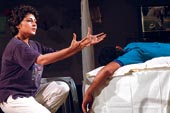 |
| Roopa Ganguly in Suprabhat. Picture by Sanjoy Chattopadhyaya |
Swapnasandhani’s experiment at Sujata Sadan appears to have succeeded. They had made a statement of sorts by preferring to do regular Saturday shows there rather than kowtow to the whimsical availability of dates in the better auditoria like most Bengali groups have to do (Sayak at Bijon and Souvanik at Muktangan the other exceptions). A few groups had followed them in sharing the space the rest of the week, but Swapnasandhani went several steps further by presenting enough new work to establish a rolling repertory. Sujata Sadan can now claim a dedicated, however small, local audience around Hazra Road.
The drama that stands head and shoulders above the rest of the repertoire at present is Malyaban. There are literary and historical reasons for this, as well as artistic and theatrical ones. As Jibanananda Das’s first novel, it provides a view of his genius drastically different from his celebrated poetry. Instead of his lush nature pictures of Bengal’s countryside, it depicts the grimy and sordid world of the city; instead of the ideal romantic love in his poems, it gives us a realistic look at sexual incompatibility and a failed marriage.
Yet it retains Das’s lyrical qualities of subtlety and sensitivity, and most happily Subhasish Gangopadhyay’s dramatisation and Koushik Sen’s direction jointly capture these qualities too. Sen is perfect in the eponymous protagonist’s role of a low-level clerk lorded over by his wife who, if anything, receives even better treatment from Reshmi Sen. She is not merely a virago, but sometimes actually gets us to sympathise with her for all her material deprivations. Sanchayam Ghosh contributes with a set split hierarchically, the top for the bedroom where Malyaban’s wife and child stay, barring him out, and the bottom for all his activities at home and outside.
Swapnasandhani also lures non-theatre viewers to theatre with two star vehicles: Suprabhat for Roopa Ganguly and Samudrer Mauna for Kabir Suman. The former is Franca Rame’s famous feminist sketch Waking Up, translated by Jaya Mitra. The latter, Bishnu De’s translation of a French story by Vercors titled The Silence of the Sea. Vercors had helped in the Resistance and wrote his story in 1942, at the height of the Nazi occupation.
Koushik Sen directs both, getting fine performances from Roopa and Suman, which usually does not happen when celebrities dabble in theatre. Roopa brought out the common marital predicament when both parties are breadwinners but when it comes to child-rearing the onus falls on the wife, manager of her job, baby and housework, while keeping her sanity and good humour. She held the frenzied and even farcical pace throughout. But Rame had composed it as a solo piece, which Sen spoils by introducing non-speaking extras.
Vercors unconventionally portrays an SS officer (Sen) who loves France’s culture, coming over to a French home and trying to communicate courteously with an older man (Suman) and a young relative (Reshmi Sen) who on principle do not talk to him. This turning of the tables suggests the impossibility of even socialising with the invaders on moral grounds. Suman underplays his character impressionably.










